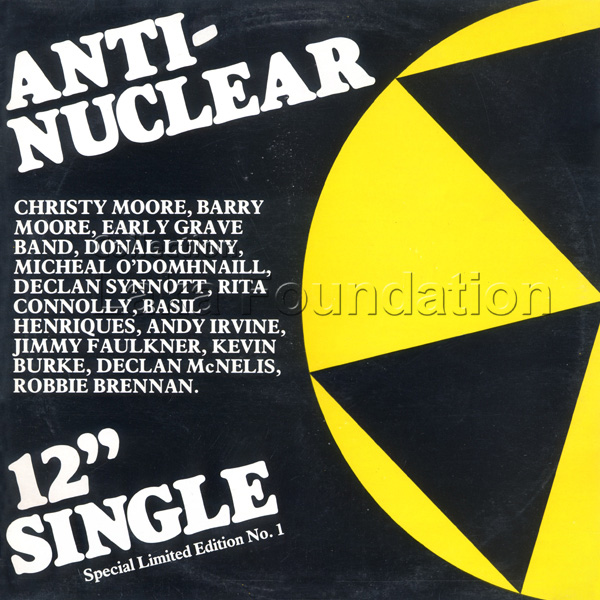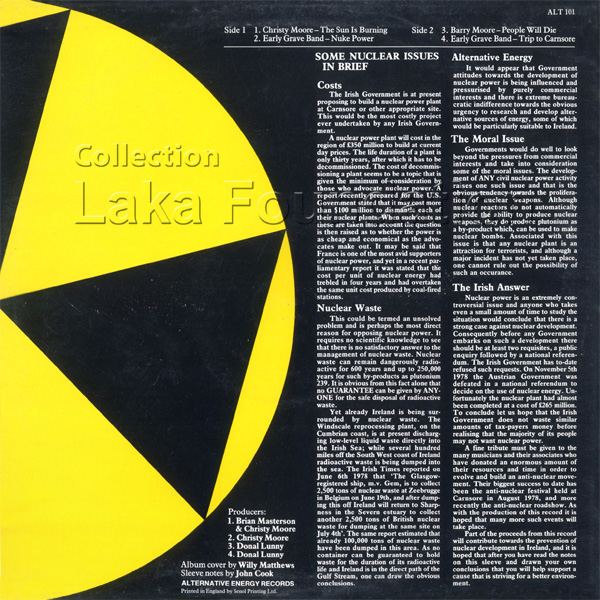
Laka has a large collection of music (on vinyl, LPs & Singles and on CD or even VHS and Music Cassettes) supporting the anti-nuclear struggle. Most of these recordings are documenting a specific struggle in a specific era and location, and are living documents of that decennia long struggle. We’re focusing on officially released music, but if appropriate added some digital content too. Music is part of Laka's 'special collections' - the culture of the international anti-nuclear movement - which also includes a large collection of anti-nuclear songbooks, posters and graphic novels. If you have anything to add, want to make a contribution or an inquiry about a specific record, please do not hesitate to contact us.
This page is still under construction, more information about the releases will be added


Various Artists
Anti-Nuclear 12” single
12" vinyl, 1979
On this anti-nuclear 12”, released in 1979, an Alternative Energy Record, Christy and his younger brother Barry Moore are the main contributors. On the back of the sleeve notes on ‘some nuclear issues’: about costs, waste, alternative energy (“there is extreme bureaucratic indifference towards the obvious urgency to research and develop alternative sources of energy”) and the moral issue. Part of the proceeds of this record went toward the prevention of nuclear development in Ireland. Which turned out to be succesfull. Carne was never built.
Christy Moore was a regular guest at those Carnsore anti-nuclear festivals, where he also sang "The House Down in Carne" or "The Ballad of Nuke Power". The song was later released on the compilation album Christy Moore - The Early Years 1969-81.


The Sussed
Don’t swim on the East Coast
Single 45rpm, 1981
The single was re-released excactly 36 years later, in 2017, in a limited pressing (300 copies) on pink vinyl.


Barry Moore
Deadly Potions
Single, 45rpm, 1983
This single, recorded in May 1983, was financed by Help Organise Peaceful Energy (HOPE) and the proceeds helped fund the campaign against the dumping of nuclear waste in the sea. Untill the early 1980’s, West-European countries, amongst them the U.K. dumped low- and medium level solid radioactive waste in the Ocean. Popular resistance and international treaties ended this type of dumping. But the reprocessing plant at Sellafield (formerly known as Windscale) continued to emit effluent radioactive waste into the Irish Sea. Especially in Ireland, but also in many other countries such as Norway, the political and societal opposition against those discharges were massive.
U2
City Of Blinding Lights
CD Single, 2005


Christy Moore
The Early Years 1969-1981
CD, compilation, 2020
Two songs, released on this compilation, were recorded live at The Abbey Tavern in early March 1980 by the Irish broadcasting station RTE. The Sun is Burning had previously been released on Moore’s 1978 album The Iron behind the Velvet and the Anti-Nuclear 12” in 1979. The House down at Carne (The Ballad of Nuke Power) has not been released under his name, but was one of the songs credited to The Early Grave Band on the 12” under the title Nuke Power. In 1979, during the hay days of the Irish anti-nuclear movement, Moore appeared at The Late Late Show where he performed the anti-nuclear song The workers are being used again: They want four nuclear stations / and who knows how many more? / If we are to stop them / we must defend Carnsore.
In 2007, Moore was named as Ireland's greatest living musician in RTÉ's People of the Year Awards.


